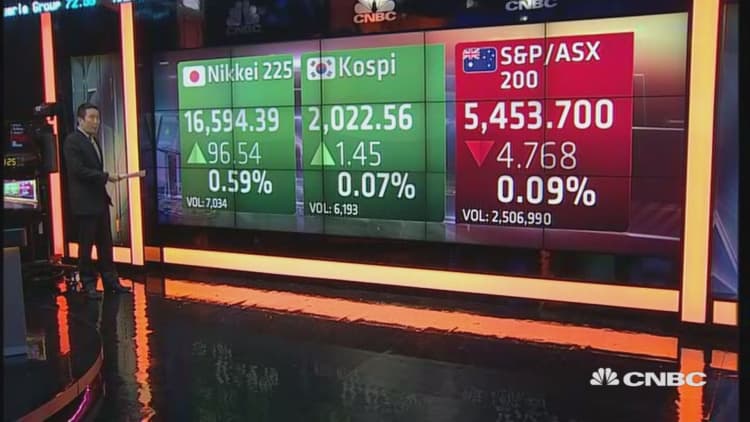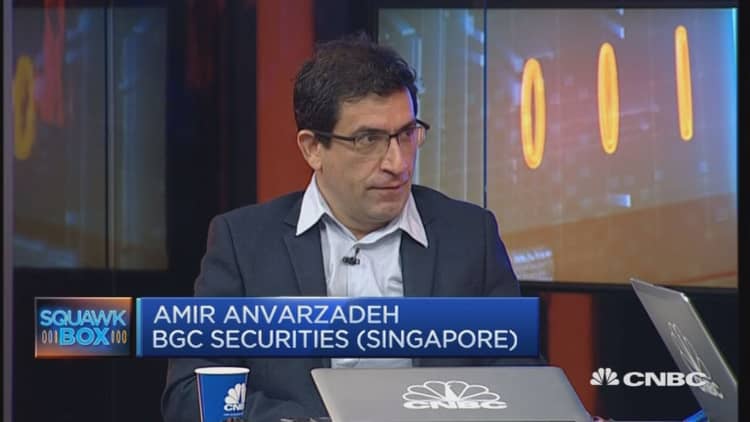


Asian markets closed mixed on Tuesday, with the Nikkei climbing despite shares of heavily weighted SoftBank tumbling around 10 percent after its $32 billion bid for a British chip firm.
Japan's benchmark beat its regional peers to close at a six-week high, up 225.46 points, or 1.37 percent, at 16,723.31, with stocks receiving a boost from a relatively weaker yen. The market was closed on Monday for a public holiday.
The broader benchmark shrugged off the sell-off in internet and telecommunications giant SoftBank, buoyed by advances in other heavily-weighted stocks including Fast Retailing, up 3.18 percent, and Fanuc adding 1.68 percent.
SoftBank shares closed down 10.32 percent at 5,387 yen, as investors reacted to the company's announcement on Monday that it had agreed to acquire British semiconductor firm ARM Holdings in a deal worth $32 billion.
SoftBank's chairman and chief executive, Masayoshi Son, said the timing of the bid to acquire ARM was not motivated by a weaker pound, after the British currency fell in the aftermath of the U.K.'s decision to leave the European Union. Instead, Son said, it was about taking advantage of the "paradigm shift" seen in the internet-of-things technology.
Some analysts believed the $32 billion price tag was a bargain for SoftBank.
"ARM's purchase is a coup," Amir Anvarzadeh from BGC Securities told CNBC's "Squawk Box" on Tuesday. "It's probably the best semiconductor-related company in the world. They have 95 percent market share [in the smartphone architecture market], all of the processes that go into mobile architecture."
Others were more skeptical.
For one, the deal appeared expensive, noted Peter Milliken, a research analyst at Deutsche Bank.
"While ARM appears an excellently positioned business, we fail to see synergies, and consider the 47 times estimated 2016 price-to-earnings to be too rich in a fast-changing sector," Milliken said.
He added that the deal will weigh on SoftBank's sum of the parts (SOTP) valuation as analysts are likely to value ARM at less than the deal price.
Milliken also cited fears that it would be difficult for SoftBank to manage the acquisition as the company would become a "high debt (but asset rich) company, exposed to difficult to model businesses such as ARM, Sprint and Asian internet, overlaid on a relatively easy to understand Japanese telco and portal."
Deutsche Bank downgraded SoftBank to Hold from a Buy rating.
Analysts previously told CNBC that SoftBank would likely use the money raised from its divestiture plan, including selling off stakes in Alibaba, GungHo Online Entertainment and more recently in Finnish mobile gaming firm Supercell, to shore up its balance sheet.
In South Korea, the Kospi closed down 4.22 points, or 0.21 percent, at 2,016.89. In Hong Kong, the was down 0.57 percent in late afternoon trade. Chinese mainland markets closed mixed, with the composite down 7.36 points, or 0.24 percent, at 3,036.19, and the Shenzhen composite finishing up 6.57 points, or 0.32 percent, at 2,034.45, reversing earlier losses.
Australian shares edged down, with the ASX 200 index closing off 7.21 points, or 0.13 percent, at 5,451.25. The materials sub-index was under pressure, dropping 1.84 percent as miners remained in focus as they release second-quarter production reports.
Major Australian miner Rio Tinto released its second quarter production results before market open, showing that iron ore shipments from the Pilbara were up 6 percent on-year. Aluminum production rose 11 percent and copper production was up 5 percent.
For 2016, Rio Tinto said it expected to ship around 330 million tonnes of iron ore from the Pilbara, subject to weather conditions. The company added the delay in its autonomous railway system meant production from the Pilbara is expected to be between 330 and 340 million tonnes in 2017.
Shares of Rio Tinto closed down 2.29 percent. Other miners were also lower, with Fortescue down 1.46 percent and BHP Billiton dropping 1.93 percent.
In Japan, shares of Nintendo continued to climb, closing up 14.36 percent at 31,770 yen. The consumer electronics company has seen a sharp spike in its stock price, up nearly 121 percent, since the release of the wildly popular "Pokemon Go" game on July 6.
Tokyo-listed shares of messaging app Line, meanwhile, dropped 8.17 percent, following a successful dual-listing on the New York Stock Exchange and the Tokyo Stock Exchange last week. The Japanese float had an opening price of 4,900 yen per share, 48 percent above its offer price of 3,300 yen, amid heavy buy orders on Friday.
In Singapore, train operator SMRT remained untraded on Tuesday. Multiple wire reports on Monday suggested the Singapore government's investment arm, Temasek, might buy the remaining shares in SMRT it does not already own and take the company private. Both Temasek and SMRT told CNBC on Monday they would not comment on speculation.
Last week, SMRT announced it reached a deal to sell its infrastructure assets, including the trains, to Singapore's Land Transport Authority (LTA) for an estimated value of 1.1 billion Singapore dollars; payments will be made in tranches. SMRT said it does not intend to pay any special dividend to shareholders from the asset sale, and that part of the proceeds would be used to pay off some of its existing debt.
Analysts at Credit Suisse downgraded SMRT to Underperform from Outperform, saying the terms of the transition were "significantly below our expectations."
Malaysia Airport shares were down 0.82 percent in afternoon trade, after closing down 5.12 percent on Monday. Analysts indicated on Monday the sell-off may have been due to uncertainties in Turkey, following the failed military coup over the weekend that led to scores of arrests and an earlier terrorist attack in Istanbul.
Malaysia Airports owns Istanbul's secondary airport, ISG, which analysts said would likely see declines in international traffic in the second half of the year. Analysts at UOBKayHian downgraded Malaysia Airports to Sell, also citing lower international traffic growth for ISG for 2016.
In the currency market, the dollar traded at 96.561 against a basket of currencies, up from levels near 96.00 in the previous week, which experts attributed to dollar strength driven by the strong performance in U.S. stocks.
"The lack of major data releases has kept G10 currencies contained within recent ranges," said Rodrigo Catril, a currency strategist at the National Australia Bank.
The Japanese yen traded at 105.87 against the dollar, similar to levels on Monday afternoon local time. The yen weakened from two weeks ago, when it traded near 100, touching an earlier low of 106.32 on Tuesday.
The Australian dollar traded at $0.7511, coming off levels near $0.76 reached Monday afternoon Asia time.
Oil prices were mostly lower, with global benchmark Brent down 0.15 percent at $46.89 a barrel, while U.S. crude futures were off 0.15 percent at $45.17.
Stateside, the closed at a record high of 18,533.05, up 0.09 percent. The S&P 500 index also closed at a new record of 2,166.89, up roughly a quarter of a percent. The composite ended 0.52 percent higher for its highest close of the year at 5,055.78.


